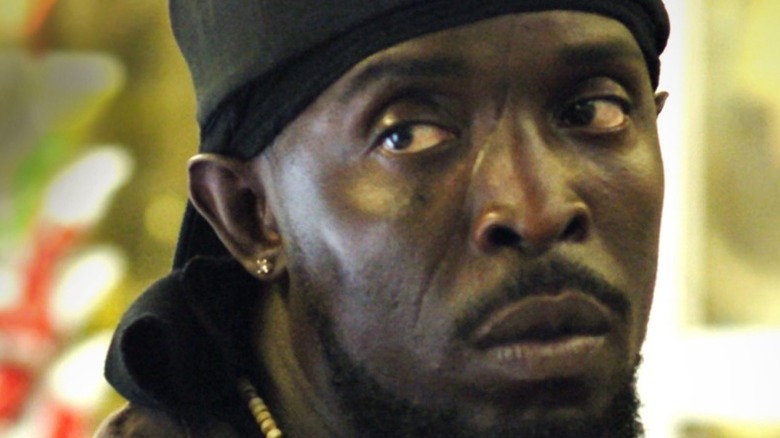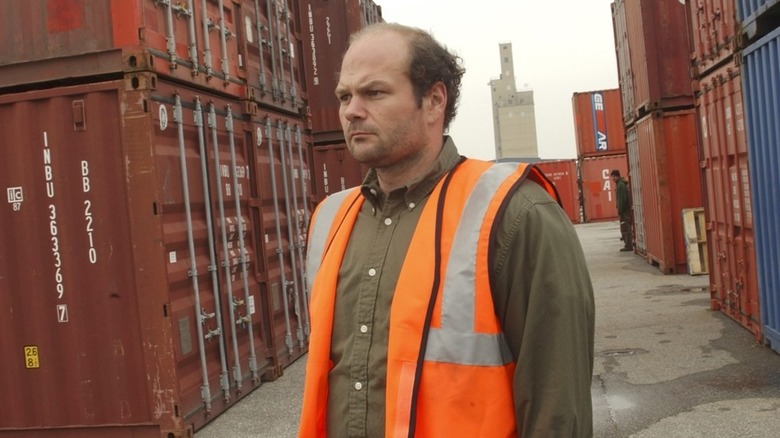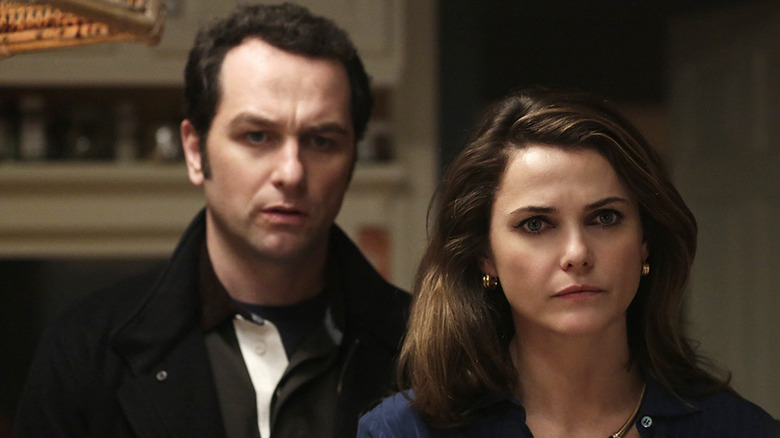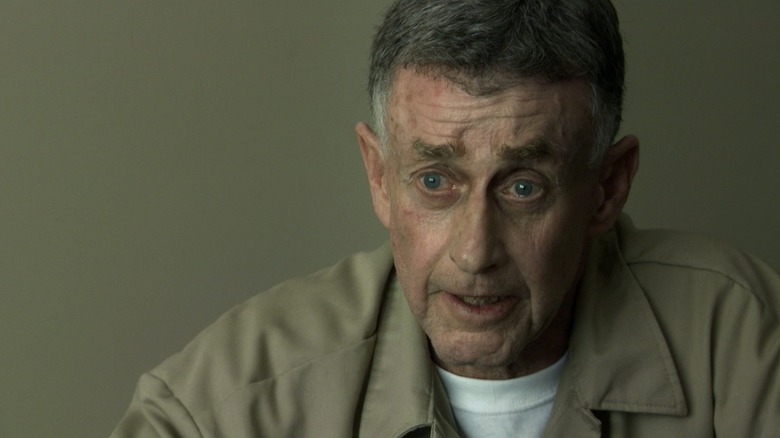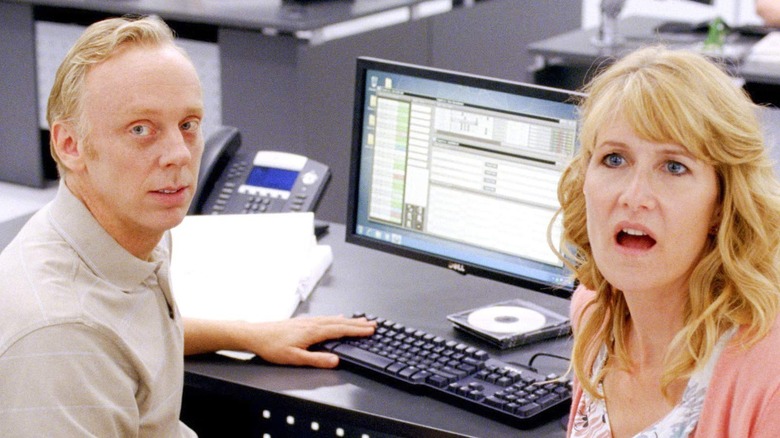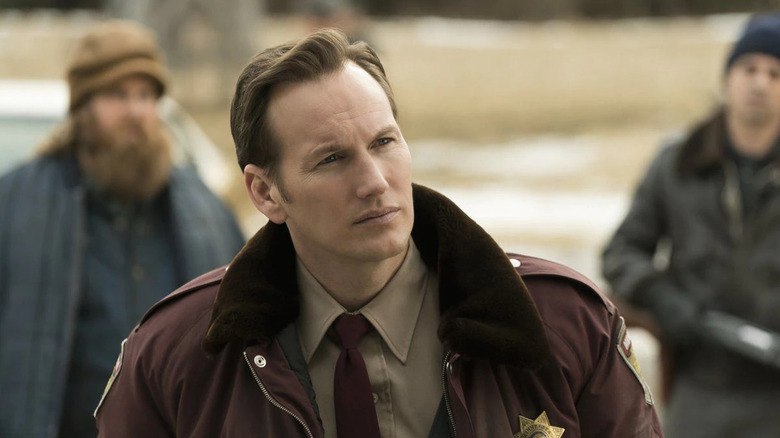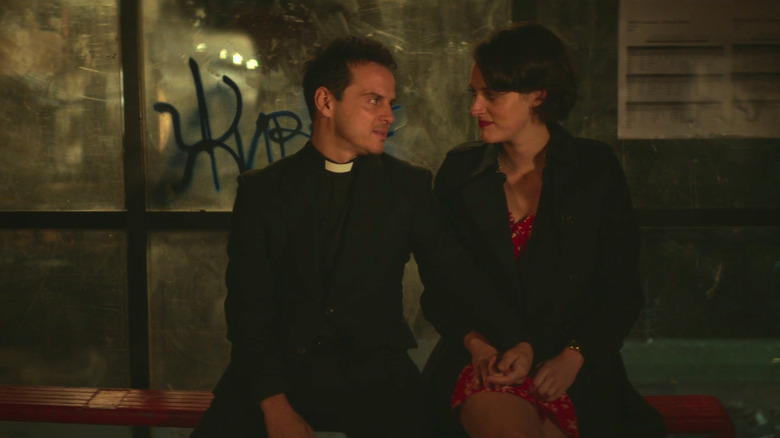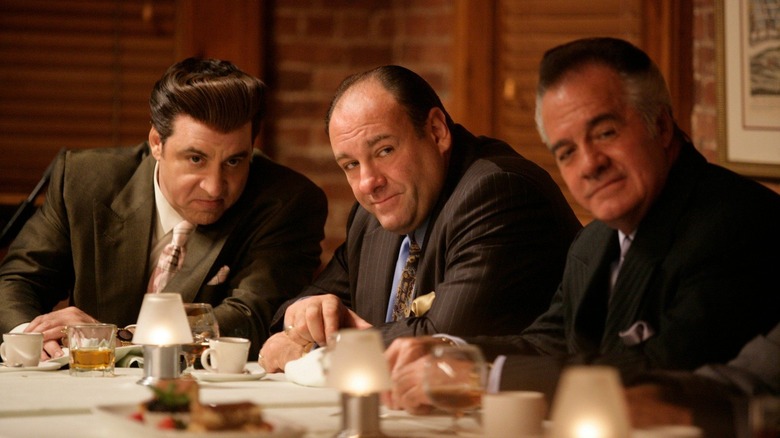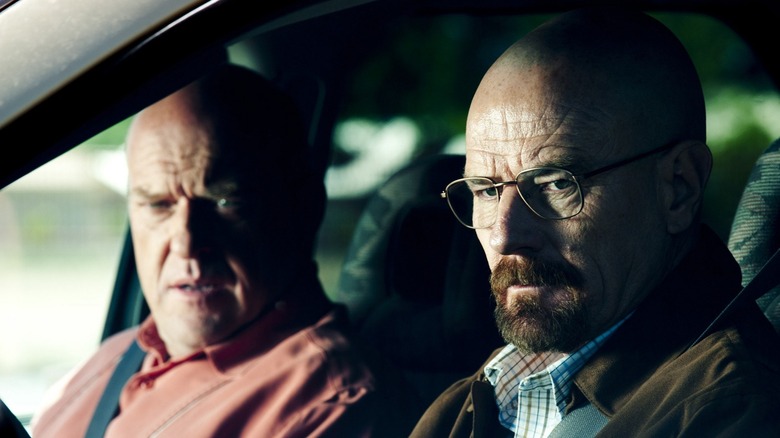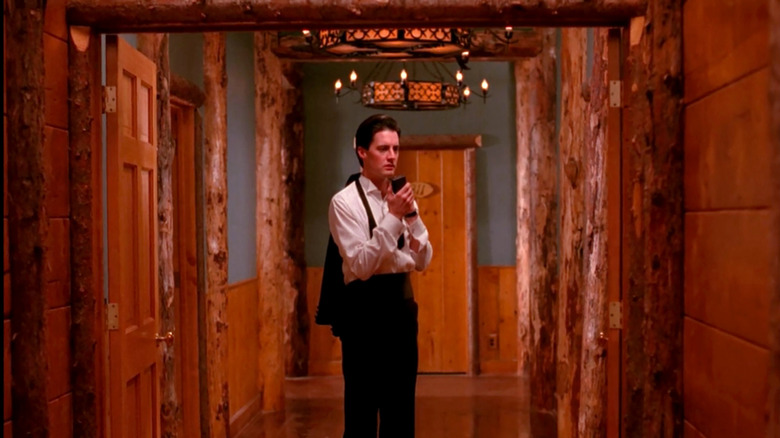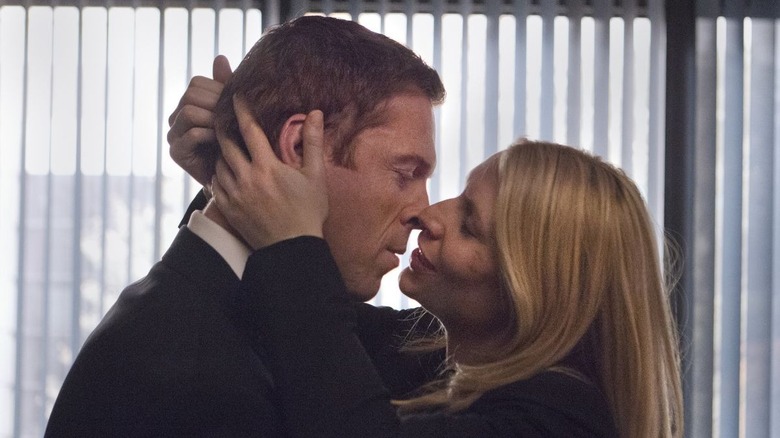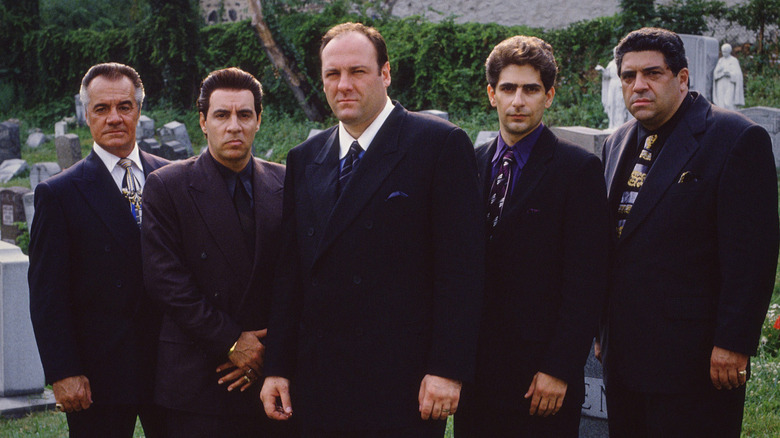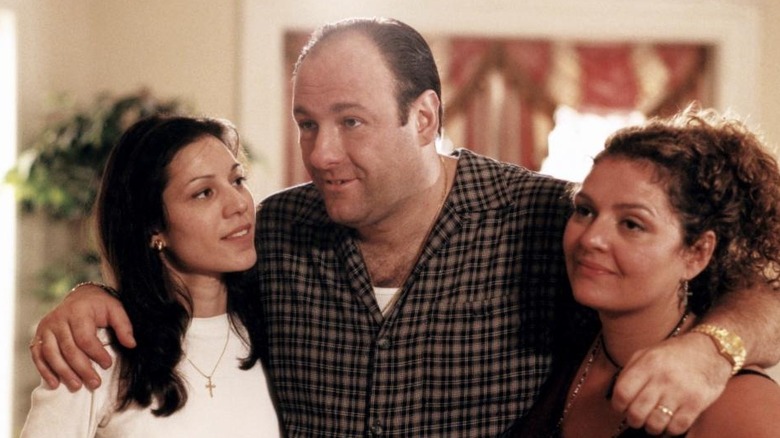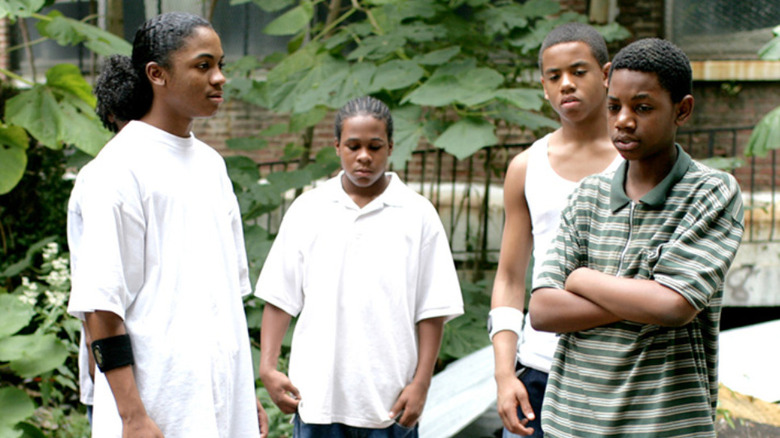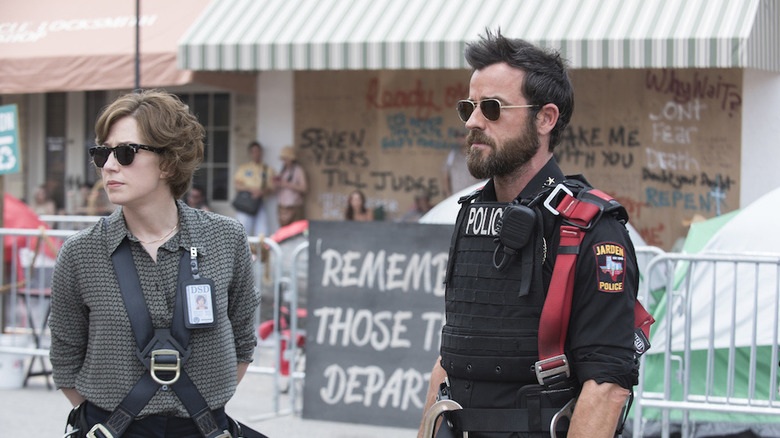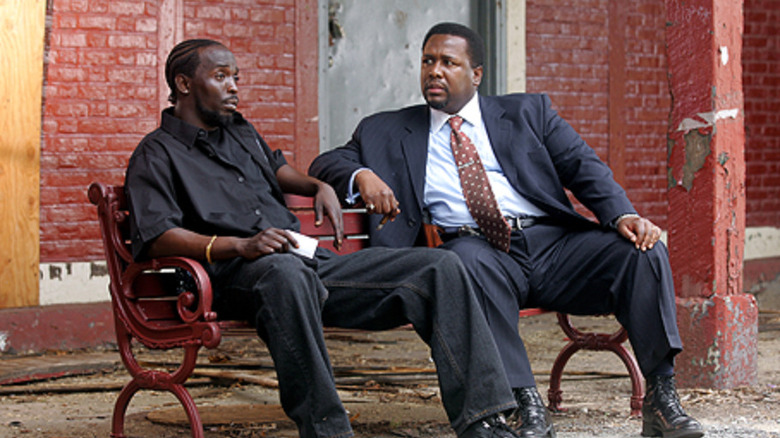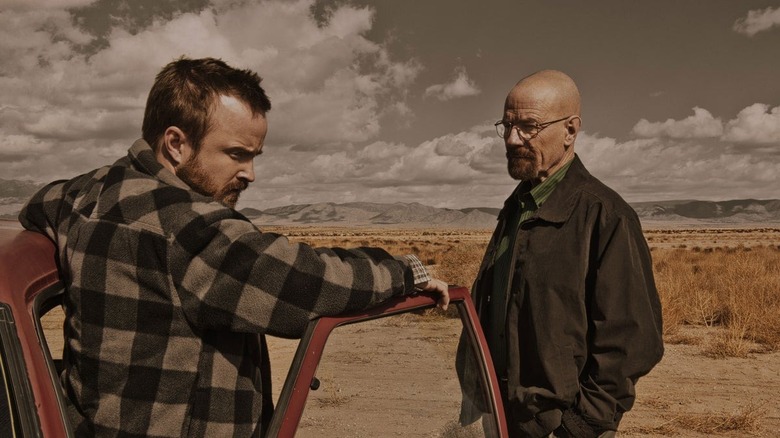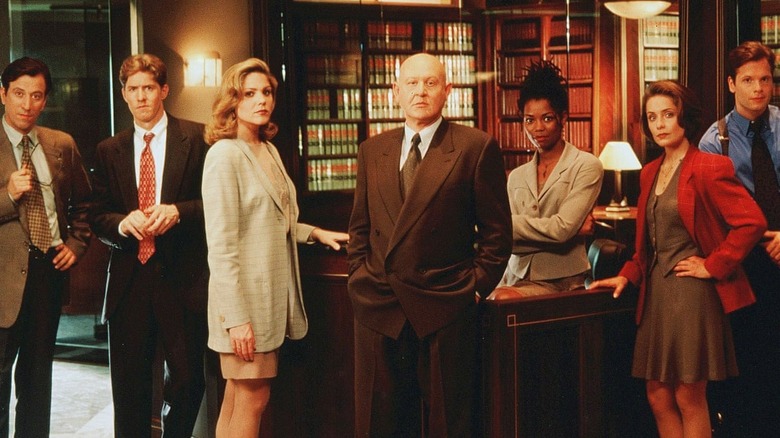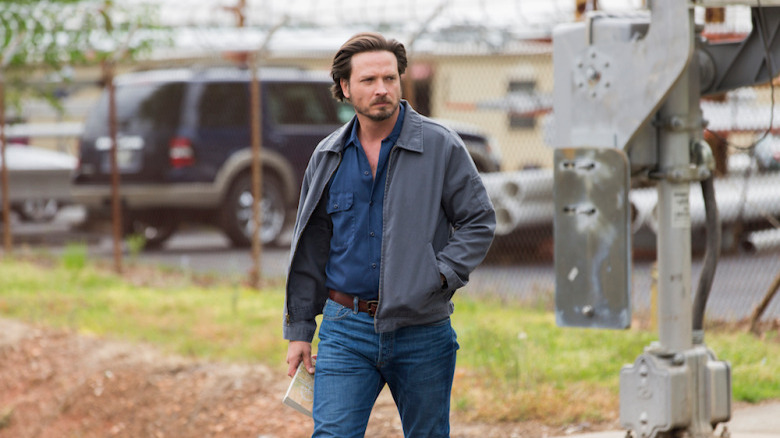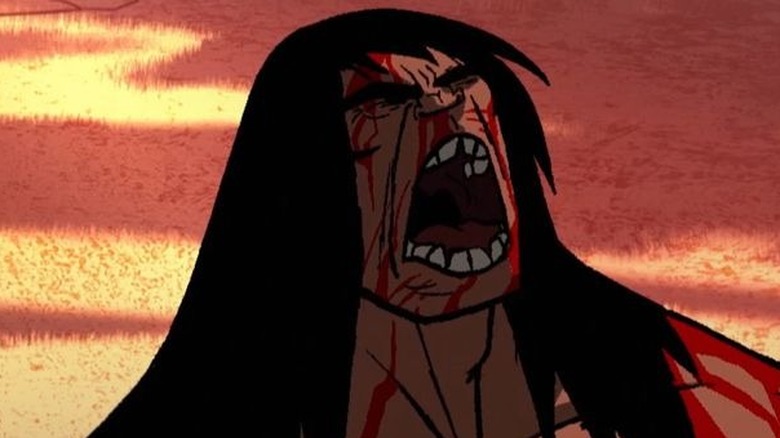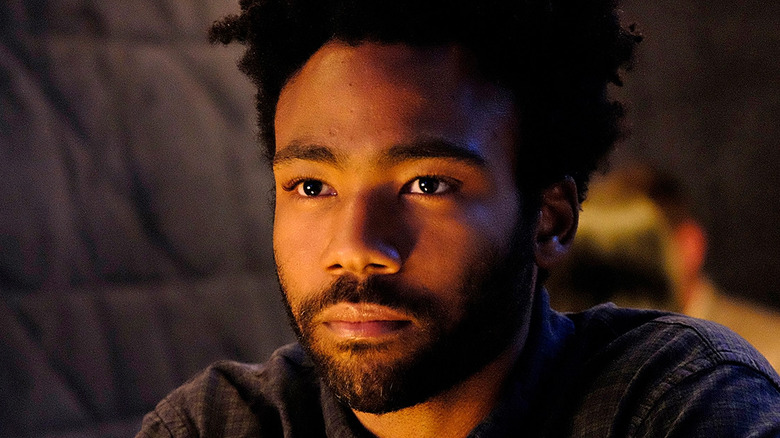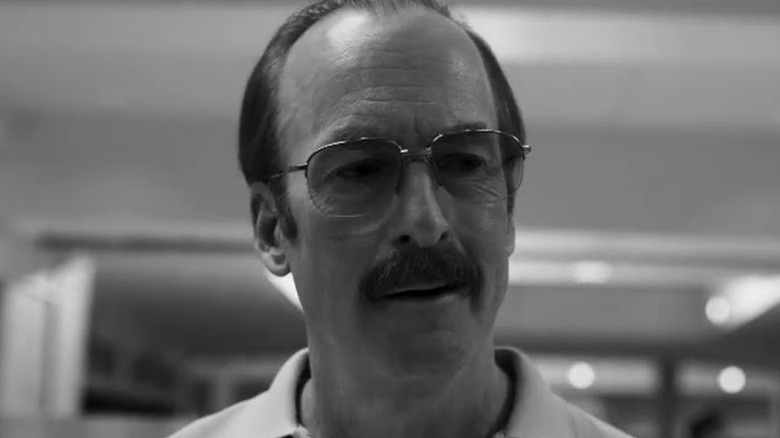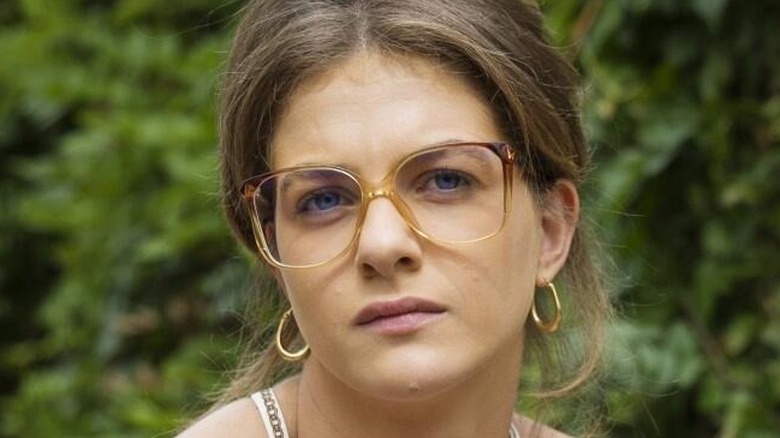There Are 23 Near-Perfect TV Drama Seasons According To Metacritic
Unlike Rotten Tomatoes, Metacritic defines itself in part through exclusivity. The site only pulls reviews from writers it considers to be top critics. Those critics are usually people who write reviews for major outlets, like The New York Times or Time Magazine.
This isn't the only difference between the two sites, though. Metacritic also assigns each review a score from 0 to 100. If a critic truly loves a show, the review gets 100; if a critic finds flaws, the score drops. After evaluating how positive each review is, the site uses an algorithm to create an average score for each movie or season of TV it's aggregating reviews for on its service. Ultimately, these scores help users choose what to watch in a landscape of seemingly limitless entertainment options. Rarely, a show or movie gets a score so high that it's almost impossible to ignore. These shows are so acclaimed that their average score is 95 or better, which suggests that critics almost universally agree that it's one of the best things they've seen in a long time.
Although the era of prestige TV has brought us everything from gut-busting comedies to musicals, it's the drama category that truly shines. The dramas below are those that earned the highest average score on Metacritic, proving that—at least according to professional critics—they're among the best seasons of TV to ever air.
The Wire: Season 2
After an incredible 1st season, "The Wire" returned for a 2nd season that dazzled critics. While the 1st season was fairly focused on the Baltimore police department's attempt to take down Avon Barksdale's drug empire, Season 2 expanded the show's focus to include the stevedores who work on the city's docks.
"The Wire" was a show about systems that were broken, and the way those broken systems ultimately affected the lives of the characters. Season 2 depicted the ways in which the dock workers were ultimately connected to the drug trade and to an international crime syndicate that flourished as a result. It also achieved the rare distinction of making a compelling drama out of the seemingly dry subject matter of union politics, from seniority rights to decertification.
The 2nd season of "The Wire" also takes a hard look at the decline of the working class, showing how the changing world has destabilized labor. The world moves forward, but when it does, it leaves some people behind. "The Wire" was about one city's problems, but they often felt so universal that anyone could easily understand them.
The Americans: Season 4
Although "The Americans" finished strong, the show's creative peaks came during its 4th season. It's in this season that the show most fully grapples with all of the ideas it's been playing with throughout its run. Philip's (Matthew Rhys) relationship with Martha (Alison Wright), a government employee he's been quietly siphoning information out of for years, finally comes undone after Philip is forced to frame Gene (Luke Robertson), one of Martha's coworkers, for her spying.
Martha's exfiltration causes a rift between Philip and Elizabeth (Keri Russell), and ultimately leads both of them to question their loyalty to a country they haven't set foot in for years. At the same time, Paige (Holly Taylor), their daughter, is now fully aware that her parents are Russian spies. By the end of the season, she's considering entering the spy game herself, and the season's final moments emphasize the price that Philip and Elizabeth have had to pay as a result of their profession.
"The Americans" was always a grim show, but Season 4 spends a huge portion of its run time examining what being a spy does to a person's soul. Philip and Elizabeth are hollow shells of people, and by the end of the season, they realize that's not the fate they want for their daughter.
The Staircase: Season 1
The recent true-crime boom that started with series like "Making a Murderer" and "The Jinx" may seem new, but hard-hitting content in this genre has been around a long time. Take "The Staircase." The series, which began in 2004—in the early days of the ongoing Golden Age of television—follows the trial of Michael Peterson, who was convicted of murdering his wife, Kathleen.
The series produced several updates following the events of the original series in 2012 and 2013, and then made further updates in 2018. Taken as a whole, the documentary miniseries from director Jean-Xavier de Lestrade chronicles not only the twists and turns of the original case, but also the corruptibility of the justice system and the horrible toll that prison can take on a person.
While a precious few miniseries offer the release of giving people definitive proof of what happened in the crime in question, "The Staircase" relishes the ambiguous set of facts that come with it. Michael Peterson was convicted, whether he's guilty or not. His family and the audience have to live with the uncertainty about whether he deserved the punishment he ultimately received.
Enlightened: Season 2
Shows as great as "Enlightened" should never be canceled, but especially not after they come off the terrific highs of a 2nd season like the one this show had. The series tells the story of Amy Jellicoe (Laura Dern), a career-oriented woman who has a breakdown and ends up at Open Air, a rehabilitation program in Hawaii. When she returns from the program a sunnier, peppier version of herself, she discovers that her old life is not willing to embrace this new version of her.
In Season 2, "Enlightened" transforms Amy into an impassioned crusader whose only goal is to take down the company she once worked for. She spends the season working with a journalist known for uncovering corruption (Dermot Mulroney), but ultimately discovers that the systems she's trying to destroy are much harder to take down than she thought. Like so many people in modern America, Amy wants to be an advocate for change, but she's caught between her fierce idealism and the intractable nature of modern capitalism. Huge, multinational companies just don't play by the same rules as the rest of us.
Planet Earth II: Season 1
As a documentary, "Planet Earth II" might not seem like it belongs on this list of dramas, but trust us (and Metacritic). There's only one season of "Planet Earth II," but this sequel to the original "Planet Earth" proves that nature documentaries don't have to be dry museum material. Narrated by David Attenborough, "Planet Earth II" is an ode to the wildlife that exists all over the planet. The footage is breathtaking and remarkably vivid, and it serves as a reminder that the world contains beauty that doesn't require any sort of computer-generated enhancement.
Wonder is just part of what "Planet Earth II" has to offer. The miniseries, which was released 10 years after its predecessor in 2016, also serves as an urgent reminder of all that the world stands to lose if nothing is done to combat the threat of industrialization and climate change. The documentary isn't explicitly political, but merely by documenting the natural beauty of the ecosystems and wildlife around us, the film highlights their imperiled state. If that's not drama, then nothing is.
Fargo: Season 2
It was easy to be dismissive of Noah Hawley's decision to adapt "Fargo," the 1996 Coen Brothers masterpiece, into a TV series of the same name. Even after the 1st season, it wasn't entirely clear how Hawley was going to transform this story into something that could last for years. After Season 2, though, people stopped worrying so much about "Fargo."
The show's 2nd season dives back into the late 1970s, a time when many Americans felt like the country was in decline, to tell a story of warring crime families and intergenerational conflict. The 2nd season is consistently thrilling and features a wave of great performances from the likes of Ted Danson, Kirsten Dunst, Jesse Plemmons, Patrick Wilson, Cristin Milioti, and Jean Smart.
The narrative is beautifully paced through the show's 10 episodes, and all of the actors know how to make a meal out of the peculiar dialect that the show relies on. By telling a story about people who lash out and hurt one another for no reason, "Fargo" Season 2 pushes against the limits of what we can know about human nature.
Fleabag: Season 2
"Fleabag" Season 2 is a love story. The 1st season followed Phoebe Waller-Bridge's titular character as she excavated the traumas of her past and her own role in creating them. In Season 2, Fleabag attempts to move forward, and ultimately finds herself attracted to a Catholic priest (Andrew Scott). The two consummate their relationship before the priest ultimately decides that his dedication must remain with the lord above.
"Fleabag" is funnier and sharper in its 2nd season, but it's every bit as devastating as it was in its initial run. As these episodes make clear, the fourth-wall-breaking that has been a core part of the show's style is also a coping mechanism for the show's main character. Fleabag talks to the camera and the audience to distance herself from the world immediately in front of her.
In the season's final moments, though, she leaves the camera behind, ready to lead a life in which she's fully engaged with the people around her. She may have lost out on the hot priest, but her ill-starred love for him gave her maturity and humility.
The Sopranos: Season 6
Given the fact that it's widely regarded as one of the great TV dramas of all time, it shouldn't be all that surprising that several seasons of "The Sopranos" feature on this list. Even in its 6th season and finale, it was still one of the very best dramas on TV.
The controversy over the finale tends to overshadow the fact that Season 6 was consistently great long before that abrupt cut to black. The 6th season was split into two parts, with 12 episodes airing in one block, followed by an additional 9-episode run to conclude the entire series.
Many of the members of Tony's (James Gandolfini) criminal organization seem to be on a path towards redemption, but they're all ultimately pulled back into the violent life of crime they've been leading all along. They may believe that they're capable of change, but as the show's final season shows, becoming a new person is much harder than it seems.
Breaking Bad: Season 4
When "Breaking Bad" starts, Walter White (Bryan Cranston) is an average guy. Maybe he's got some anger issues, and maybe he feels stifled by his job as a high school chemistry teacher, but he's a dedicated family man. That changes when he gets a cancer diagnosis, setting off a chain of events that leads him to start making and selling meth. By Season 4, Walt is still alive, but he's become an irredeemable monster.
Season 4 was so well-regarded in part because it's the season where Walt fully embraces this transformation as he attempts to take down Gus Fring (Giancarlo Esposito), the show's biggest villain. Walt wins his battle with Gus, but it comes at an incredibly soul-corrupting cost. He poisons a child. He plants bombs on an old man's wheelchair. By the end of Season 4, Walt is willing to do anything to achieve power.
Aside from featuring some iconic and memorable scenes, Season 4 plumbed the depths of each of its characters, achieving both high drama and the darkest shade of black comedy.
Twin Peaks: Season 1
Laura Palmer is dead. That's the simple premise of "Twin Peaks," one that horrifies creators David Lynch and Mark Frost as much as it enthralls them. Across its 1st season, "Twin Peaks" aired 8 nearly perfect episodes that were focused on finding Laura's killer and discovering the seedy underbelly of the town of Twin Peaks.
Across those eight hours, "Twin Peaks" combined elements of a murder investigation with small-town drama, science fiction, and a few helpful handfuls of soap opera storytelling. As with much of Lynch's work, the tone is nightmarishly surreal and incredibly stylish, complicating what at first gloss might seem like a standard police procedural. Twin Peaks feels like a normal town, but it's hiding a darkness as deep and terrifying as the pits of hell.
Although the show stumbled in its later seasons, the 1st season alone made "Twin Peaks" one of the most important and impactful TV series of all time. Decades after its 1991 air date, it still feels like audiences aren't fully ready for what the show has to offer.
Homeland: Season 2
"Homeland" rode the wave of rave reviews for its 1st season into its 2nd. Although the critical reception to the show eventually became less rapturous, Season 2 proved to be a high watermark. The show, which follows Carrie (Claire Danes), a CIA agent with bipolar disorder who becomes convinced that a returning war veteran named Brody (Damian Lewis) has been turned by Al-Qaeda, ramps up the stakes in its 2nd season. At the end of the 1st season, Brody fails to detonate a bomb designed to assassinate the vice president after a conversation with his daughter; Season 2 deals with the fallout of Brody's lack of action.
Carrie and Brody eventually strike up a relationship, which only complicates Carrie's place inside the CIA. The espionage on "Homeland" is a huge part of the show's appeal, but the relationships between its characters are what make the show feel truly lived in. "Homeland" was a phenomenon upon its initial release, and the reviews for Season 2 proved that it was a series with some staying power.
The Sopranos: Season 3
By the time "The Sopranos" was in its 3rd season, it had cemented itself as one of the best TV shows on the air, and possibly of all time. In Season 3, the show dives even deeper into Tony's psyche and the reason for his continued panic attacks. Christopher (Michael Imperioli), who has been a presence on the show since the beginning, rises in the ranks inside the mob and becomes a made man, and we get deeper insights into Tony's relationships with his children. The season also gave us one of the best—and hardest to watch—episodes of the entire series, in which Dr. Melfi (Lorraine Bracco) is understandably tempted to use her client's extrajudicial power.
The genius of "The Sopranos" was the way the show managed to put equal emphasis on every aspect of its character's lives. The mob stuff was as compelling as ever, but it was only made more interesting by the investment the show had in everything that Tony did when he wasn't working. There was never any separation in Tony's life, and as his children grow up and attempt to chart their own course, that only becomes more and more evident.
The Sopranos: Season 2
With only slightly better reviews than the season that followed, Season 2 of "The Sopranos" was able to build off of the excitement that many critics had after the show's incredible 1st season. Although some have come to see the 2nd season as a bit of a letdown, it's also received plenty of praise.
In the 2nd season, Tony discovers that one of his closest friends is an FBI informant, and he continues to see Dr. Melfi in spite of her increasing disgust over what he does for a living. Meanwhile, Tony's sister (Aida Turturro) returns to his life, and she and Tony must deal with their relationship with each other and with their mother.
The 2nd season of "The Sopranos" is every bit as strong as the 1st, even if it's not as shocking as those initial episodes of the show might have been. In Season 2, "The Sopranos" proved that it could go for the long haul.
The Wire: Season 4
The 4th season of "The Wire" may be the most heartbreaking. Each season of the show focused on a different institution within urban Baltimore. Season 4 turned the camera on Baltimore's youth and the underfunded school system that tries desperately to keep them from turning to crime.
It's tough to watch how the system slowly corrupts innocent children, but it gives audiences a full picture of exactly how broken the world of "The Wire" is—a world that closely mirrors our own. The seasons' other major storyline, which involves the primary race for Baltimore mayor, establishes how the political machine stifles any attempts at reform.
Thomas Carcetti (Aidan Gillen) ascends to the office of mayor intending to change the systems that have trapped so many people in difficult circumstances, but finds himself unable to deliver. The frank look at municipal dysfunction gets leavened by moments of gallows humor.
The Leftovers: Season 3
By the time Season 3 rolled around, "The Leftovers" was the definition of critical darling. After a divisive 1st season and a critically adored 2nd, expectations were high for the 3rd season, and boy did the show deliver. Set seven years after the departure that launched the series, Season 3 focuses on the show's core characters reckoning with whether they've actually evolved in the years since 2% of the world's population vanished.
The show is just as strange as ever in Season 3, which shifts much of the action to Australia as some characters begin to suspect that the end of the world is imminent. In a season that consists of only 8 episodes, the show manages to tie off many of its relationships, and also provides glimmers of hope for characters who have spent much of the series totally lost.
In a brutal, perfect finale, we see the character of Nora (Carrie Coon) living alone in the distant future after attempting to reunite with the family she lost on Departure Day. The episode is beautiful, haunting, and lovely, and it's a great showcase for Justin Theroux and Coon, who give two all-time great performances as the show's broken, desperate leads.
The Wire: Season 3
Considered by critics to be the show's best season, Season 3 of "The Wire" has much to offer. The season's central premise is the creation of safe zones throughout the city of Baltimore where drug activity is legal (a situation hilariously dubbed "Hamsterdam"). It's a dangerous, high-stakes approach to crime management that seems irresponsible, but ultimately leads to lower levels of violence in the district where the rules are put in place.
Ultimately, though, those safe zones are exposed, and politicians use their existence to make grandstanding speeches. Meanwhile, the drug war continues unabated across the rest of the city, and violence escalates to the point where Stringer Bell (Idris Elba) is offed by Omar Little (Michael K. Williams) and Brother Mouzone (Michael Potts).
The season is a masterpiece of carefully plotted story, one that imagines a brighter future for Baltimore that always seems to be just out of reach. "The Wire" never shied away from the systemic nature of the problems it depicted, but in Season 3, it also showed how decisions made by the people in those systems can either reinforce or untangle those problems.
Breaking Bad: Season 5
"Breaking Bad" went out on top. In its 5th and final season, Walt is finally making all the calls. He's the head of his own meth empire, and he's working with Mike (Jonathan Banks) and Jesse (Aaron Paul) to become one of the major forces in the drug trade in the southwest. Much like "The Sopranos," the first half of this split season shows us something close to a meteoric rise for Walt in the aftermath of Gus Fring's death.
Ultimately, though, that rise can't last. Walt's brother-in-law, Hank (Dean Norris), discovers that Walt is the elusive meth dealer he's been tracking for years. Hank's unraveling of Walt's secret ultimately leads to Walt's downfall, as his family loses everything and he's forced to go on the run. Jesse winds up imprisoned by a group of neo-Nazis, forced to cook meth or be cruelly and painfully tortured. Walt finds some measure of redemption and humanity in sacrificing himself to save Jesse.
Season 5 is a bleak masterpiece, a reminder that all of the terrible things audiences have watched Walt do over the course of several seasons will eventually come back on him and those around him.
Murder One: Season 1
"Murder One" is not as well known as many of the series on this list, but that doesn't mean the show wasn't influential. It lasted for only two seasons, and was created by Steven Bochco, who also wrote on hugely acclaimed shows like "Hill Street Blues" and "L.A. Law." "Murder One" broke the mold when it debuted in 1996, focusing for the entirety of its 1st season on a single criminal case.
The show follows the work of a defense firm to clear the man accused of murdering a woman. In heavily serializing its story, "Murder One" helped to more firmly establish the idea that viewers would be interested in the minutiae of a case as it winds its way towards a trial (as opposed to the self-contained episodic nature of shows like "Law & Order").
None of this formula-breaking would have worked if the story itself wasn't so solid. Fortunately, the series knew exactly what it was doing, and managed to make every detail of the criminal case more fascinating than the last.
Rectify: Season 4
"Rectify" is a story about broken people who are working to make themselves whole. The show follows a man (Aden Young) who spent nearly 20 years on death row for a crime he did not commit. DNA evidence ultimately exonerates him, and he's released from prison. When he returns to his hometown, he finds it a strange place totally unlike the one he left, and he's forced to reckon with all of the relationships he left behind when he was incarcerated.
Through every season and especially in its 4th and final outing, "Rectify" was a quiet, deeply moving character drama. It never overplayed its hand, and it allowed its characters to grow and change as the episodes progressed. "Rectify" may not be remembered as one of the best TV shows of all time, but that's because it has none of the flair or excitement that defined many of the series on this list. Instead, it was happy to be contemplative and beautiful in ways that most TV shows rarely try to be.
Genndy Tartakovsky's Primal: Season 2
Clearly a long-simmering, delicately-executed passion project for its creator, an animation titan who looms so large over his world that his name is in the title, "Genndy Tartakovsky's Primal" is one of the most ambitious, visually deep, and gorgeous TV cartoons in decades. This is an epic fantasy quest that feels more like every famous novel saga smashed together than an Adult Swim show from the person who conceived "Dexter's Laboratory" and "Hotel Transylvania."
Consciously historically inaccurate to maximize drama and possibility, "Primal" takes place in a distant prehistoric time period in which humans, earlier evolutions of humankind, and dinosaurs all live among each other, fighting to survive and thrive. The action centers on Spear, a Neanderthal and caveman left alone in a brutal world when a pack of dinosaurs kills his family. He befriends a small dino whose family was killed by the same vicious clan, and they form a de facto unit and a strong bond, which fuels the action in the almost critically-perfect Season 2 of "Primal."
Atlanta: Season 2
A thoughtful, meditative, surreal look at modern life — particularly for young Black men balancing artistic pursuits with that of a need to make enough money to pull themselves out of poverty in a world hostile to them — "Atlanta" is a dazzling series that changes its tone as the story requires, with each season and even every episode within those seasons wildly different from one another. Created, chiefly written, and starring comedian-actor-musician Donald Glover, "Atlanta" routinely churns out 30-minute masterpieces, and according to Metacritic, the best of them fall within Season 2 of the show, subtitled "Robbin' Season" to reflect a certain desperation felt by the extended universe of characters in this barely fictional representation of the titular Southern metropolis.
Season 2 of "Atlanta" is the best of them all, according to Metacritic. As Earn (Glover), Vanessa (Zazie Beetz), Paper Boi (Brian Tyree Henry), and Darius (LaKeith Stanfield) tentatively go about their business, they variously encounter Earn's unhinged uncle (and a rogue alligator), attend a creepy cultural festival, and meet Teddy Perkins, a bizarre and almost ghostly pop star.
Better Call Saul: Season 6.5
The final part of the final season of the final chapter of the "Breaking Bad" saga certainly stuck the landing. Bob Odenkirk joined the cast of "Breaking Bad" midway through its run as Saul Goodman, a sleazy bus-bench lawyer who helps with the legal issues of the show's various drug manufacturing and distributing characters. He was so compelling, AMC commissioned the spinoff "Better Call Saul," a "Breaking Bad" prequel that showed how small-time hustler and part-time public defender Jimmy McGill evolved from a sweet and scrappy Albuquerque nobody into a swaggering wheeler-dealer of questionable morality.
By Season 6.5 of "Better Call Saul," the transformation from Jimmy to Saul nears its completion, while the rest of the "Breaking Bad" backstory also gets filled in, showing how all the pieces lined up for Walter White to become a meth kingpin amidst a world of ruthless traffickers and mercenaries. Character-driven and empathetic, the final slew of "Better Call Saul" episodes also give quite a few glimpses into what became of Jimmy after he had to abandon his life and identity as Saul and seek out a quiet if boring existence running a Cinnabon in the Midwest.
My Brilliant Friend: Season 3
Based on acclaimed Italian novelist Elena Ferrante's books of the same name, "My Brilliant Friend" was produced for Italian television but airs in the U.S. on HBO. Ferrante has co-written every episode of the critically lauded series, of which "Those Who Leave and Those Who Stay" is, to date, the most artistically notable. The novels and television adaptation tell the story of the complicated, triumph-and-tragedy filled friendship between two girls from a poor neighborhood near Naples who met as children in the 1950s.
At the outset of Season 3, it's the dawn of the 1970s, and Lila and Elena (or Lenu, a thinly veiled version of Ferrante), have taken very different paths into their young adulthoods. Lila is struggling, having married at 17, birthed a child, and left her husband. She finds herself working in a meat processing factory to support herself. Lenu, meanwhile, has left Naples, become a famous author, and is running ever so uncomfortably among the wealthy literary elite. As each season tells a different part of the long saga, and is set in a different era, the filmic nature of "My Brilliant Friend" changes. Season 1 and Season 2 serve as homages to mid-century cinematic movements like Neorealism and French New Wave, while Season 3 embraces its '70s-ness and looks and feels like the first slew of American indie movies of the era.
